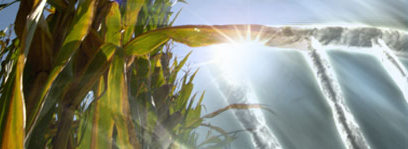
An expanded Plant and Soil Sciences eLibrary website will give students, adult learners, teachers and industry a place to learn interactively and globally.
The new site at http://passel.unl.edu offers more collaborative tools and uses social media to accompany its animations, lessons and wealth of information and course materials, said Deana Namuth-Covert, plant science educator and eLibrary director.
Namuth-Covert said the new site will give current users a place to work together and share ideas. In addition, the site has a new look and new tools to continue drawing in users from across the state, country and world.
"We thought 'what if we could get a group of biology teachers together?'" Namuth-Covert said. "By creating a community-like space, they and other groups would be able to share ideas and have discussions using social media tools."
The Plant and Soil Sciences eLibrary is on Facebook and Twitter @eLibrarypro.
Namuth-Covert said students or adult learners can use the site to interact with one another or stay up-to-date on research-based life science curriculum. Instructors and teachers can use the site to share ideas with other teachers, provide electronic materials for a course, or even have students learn from others around the world. Industry can use the site to provide peer-reviewed plant biology and soil science training materials and continuing education for those working in the field.
The new site also provides a way for members to develop their own materials by creating lessons or uploading videos/animations. Later, these materials may be submitted for review and published in the eLibrary for all users to see.
"The new site’s interactive tools, such as discussion forums, real-time online meeting rooms and communities, and its potential for world collaboration take the eLibrary to the next level," she said.
The Triticeae Coordinated Agricultural Project funding has supported in part the creation of these new tools. It is also providing a cohort of students to test the environment. Graduate students are meeting weekly in the environments to learn plant-breeding strategies and discuss research.
"The online discussion posts and synchronous discussions have allowed for more student interaction than normally occurs in a class," said Jamie Sherman, education coordinator of T-CAP. "The network has brought together students from all across the country, providing a unique opportunity for collaboration."
Some of the communities already online include the Plant Breeding Training Network, the North American Invasive Plant Ecology and Management Short Course and the Crop Science Investigation Network.
With the NAIPSC, for example, Steve Young, UNL weed ecologist at the West Central Research and Extension Center at North Platte, conducted a short course that brought participants and instructors from around the region for a workshop. They later formed a community on the eLibrary site.
"It worked as a way for them to stay connected and interact with participants," Namuth-Covert said. "The eLibrary really is what we already do through extension, only in an electronic venue."
The Crop Science Investigation Network has a different goal. Its mission is to provide crop and soil science education materials for 4-H and FFA youth. The community provides information about workshops across Nebraska, as well as some online resources. The CSI will soon be partnering with the Life Science Educators Community, which will bring together secondary educators across the country. The goal of this community is to provide a forum for teachers to share ideas and develop materials together. Another community, the Experiential Learning in Agricultural Sciences, is providing resources on education research for assisting undergraduate teachers.
Other communities and classes are under development, and several courses will be offered through the eLibrary in 2011 and 2012.
"Science institutions and, in particular, land-grant universities, have a mission to provide unbiased information, based on research, through extension and education programs," she said.
"A key challenge is to update and develop new educational materials that keep instructors/outreach experts and their courses/workshops at the cutting edge so these new technologies may be rapidly adopted by end users," Namuth-Covert said. "To address this challenge, our team has continued to develop a curriculum to meet the needs of professionals and adult learners interested in continuing education, as well as students interested in pursuing formal academic degrees."
Since its inception in October 1999, the Plant and Soil Sciences e Library project, a learning project collaboration, has grown. So far, 10 universities across the country plus Costa Rica and Mexico contribute to the site that hosts 238 lessons and animations (some in Spanish) with plans for more within the year. Namuth-Covert said she has received emails from across the globe – from Brazil to Israel. The past year the site received 13.5 million hits from 596,075 unique visits.
For more information, contact Namuth-Covert at 402-472-1549 or dcovert2@unl.edu.